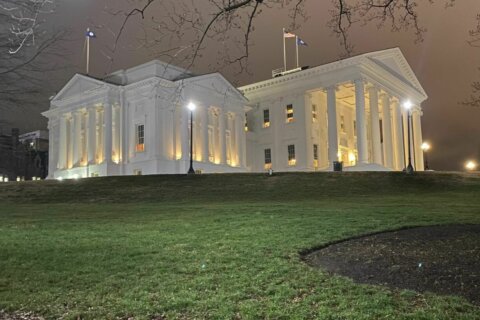
Virginia lawmakers are set to approve a 10 cent gas tax increase over the next two years and transportation funding changes that would restore Northern Virginia money cut a few years ago as part of a Metro funding deal.
The agreement among Virginia House and Senate negotiators comes amid a rush of action in the final days of the legislative session.
According to preliminary information provided to WTOP, the deal would include 5 cent gas tax increases this year and next year, then the gas tax would be tied to inflation.
The 10 cent increase splits the difference between a Senate proposal to raise the gas tax 8 cents over the next two years and the House plan to raise the gas tax 12 cents over the next three years that tracked the originally introduced bill.
The additional regional gas tax already in place in Northern Virginia, Hampton Roads and along Interstate 81 for local projects would also be expanded to other parts of the state, including the Fredericksburg area.
A separate bill regarding Northern Virginia transportation funding that was shifted to Metro in 2018 proposes raising certain real estate transfer and hotel taxes in Northern Virginia to make up the difference in revenue.
House Speaker Eileen Filler-Corn called it “a huge win” for Northern Virginia.
Gov. Ralph Northam supports the general principles of the plan, and the administration has been involved in negotiations on the bill. Northam’s proposal also includes bond authorizations for I-81 corridor improvements and major rail upgrades along I-95.
The conference agreement, which Northam could still offer tweaks to in coming weeks ahead of April’s reconvened session, would keep annual car inspections but reduce some fees for vehicle registrations.
Final technical language was still being developed early Thursday afternoon.
Top lawmakers were still working late Thursday night to finalize a budget deal, as they aim to meet a Saturday deadline to adjourn the annual session without waiving rules about how long lawmakers have to review the agreement before a vote.
The House and Senate used a procedural move to go into recess overnight rather than adjourning for the day so that they could finish processing bills Friday morning without missing a deadline.
The chambers will adjourn Thursday’s session sometime Friday and then convene to only consider conference reports working out differences between the two chambers.
Agreements on other bills, such as the details of marijuana decriminalization and a minimum wage hike, can be reached any time between now and Saturday afternoon or evening.
Gun bills
Expanded, “universal” background checks will only apply to gun sales, not other gun transfers, under the final language of bills agreed to by the House and Senate.
Under a separate agreement, the return of Virginia’s one handgun per month purchase limit will include an exception for concealed carry permit holders.
Other action
Bills sent to Northam’s desk Thursday include changes to provide immunity from drug or alcohol possession charges for people seeking medical help during an overdose; limiting immigration status inquiries; and adding new ways to track people convicted of driving under the influence that will allow them to drive anywhere rather than only restricted routes.
The General Assembly also agreed to require paid sick time for workers at companies with at least 15 employees, to repeal Virginia’s voter ID law and to ban slot-like “skill machines” that have popped up recently in a way that allows facilities like Chuck E. Cheese to remain open.
Other conference reports published Thursday include automatic voter registration, which changes the process from an “opt-in” procedure at the Department of Motor Vehicles to an “opt-out,” and new rules requiring the state to collect data on the use of force by school security officers.
The General Assembly also approved legislation meant to address bills for out-of-network hospital treatment, requiring health insurance to cover care regardless of a person’s gender identity, and providing an opportunity for parole to many people sentenced during the period when juries were not told parole had been abolished.
Lawmakers also banned strip searches of children under 18, except if they are in custody after a series of issues for visitors to state prisons, passed a bill limiting property seizures through forfeiture to only cases where there is a conviction as long as the person submits a written request asking for the property back, and approved raising the minimum age juveniles are automatically tried as adults for some crimes from 14 to 16.
Beginning this November, absentee ballots that are postmarked by Election Day and received in the days immediately following would be counted in Virginia for the first time.
Courts could also defer disposition of cases of defendants with autism or intellectual disabilities, and school mold testing would be required starting next year.
The House voted down a bill that would allow Dominion Energy to charge ratepayers for later years of an electric school bus program, and the Senate appeared set to approve a bill opposed by Dominion that would provide some additional oversight of certain costs.
Redistricting amendment
The House put off a vote late Thursday on a potential change to how Virginia handles redistricting next year.
Del. Cia Price, D-Newport News, and Del. Lashrecse Aird, D-Petersburg, spoke strongly against the constitutional amendment again Thursday morning, citing alternatives that could better protect minority voters.
Supporters of the amendment say that though it is not perfect and is not nonpartisan, it at least lays out a bipartisan process that could be used if voters approve the amendment this fall.
Under the amendment, if the panel does not agree on maps, then the Virginia Supreme Court would draw the lines.
The amendment language was approved right at the end of last year’s session after it became clear an original proposal would not be able to pass. The exact same language must be approved this year in order for an amendment to be presented to voters this fall in time for next year’s redistricting process.
If the amendment is not approved, the Virginia General Assembly can lay out its own process to draw lines for the House of Delegates, state Senate and Congress.
An alternative proposal introduced Thursday would create an independent redistricting commission that did not include legislators and also reflect Virginia’s diversity. If the alternative proposal is adopted, the constitutional amendment would not go to voters this fall or apply in 2021.
The alternative could be adopted again next year and put to voters in 2022 to apply in 2031 and beyond.
Confederate monuments
In an emotional debate Wednesday over bills that would allow localities to move or contextualize Confederate monuments, Sen. Mamie Locke, D-Hampton, got so frustrated with those who want to keep protections in place that she had to stop talking and sit down.
Locke called the monuments symbols of Jim Crow and massive resistance. Sen. Louise Lucas, D-Portsmouth, patted her arm.
Sen. Jennifer McLellan, D-Richmond, another black legislator, tried to explain the hurt from the monuments, which she said simply stand for the “Lost Cause” narrative.
Sen. Amanda Chase, R-Chesterfield County, argued that though Confederates may have had a role in slavery, as people, they also did good things and still have descendants in Virginia today.
Another Republican, Sen. Jen Kiggans, who represents part of Virginia Beach, said allowing the removal of the monuments would simply divide Virginians further.
Locke later said she has had to walk past the “stupid monuments” erected for the Lost Cause for far too long, since the monuments simply say to her that her life and the lives of her black colleagues don’t matter.
Sen. Chap Petersen, a Democrat from Fairfax City with long family roots in Virginia, said hearing from his colleagues convinced him to change his mind and vote for the bill.
The debate Wednesday, which was on a procedural vote in the Senate, even sparked a rare speech on a bill from Lt. Gov. Justin Fairfax as he presided over the Senate. Fairfax called it amazing, ironic and shocking that people continue to repeat racist mistakes of the past, and said the changes for the Confederate statues are much deeper than a simple vote.
The Senate changes to the House version of the bill passed the Senate 21-17 on Wednesday. House changes to the Senate version passed the House 50-46 on Wednesday.
The two chambers have to work out language differences.
Lots of action this week
Lawmakers have sent a series of other significant bills to Northam’s desk over the last few days that:
- Bans discrimination in housing based on how someone is paying their rent (which protects people getting housing assistance through programs such as vouchers).
- Requires all school systems to provide free tampons or pads for students in bathrooms at each middle and high school, and that the supplies be available if needed for students somewhere in each elementary school.
- Updates state immunization requirements for students for the first time in more than a decade, and allows the Virginia Department of Health to keep the list updated moving forward.
- Raises the age where it is illegal to smoke with a child in the car to cover children under 15.
- Establishes a voluntary “do not sell list” for guns that people could put themselves on, as part of an effort to prevent suicides.
- Requires Virginia State Police to do background checks on all gun sales at gun shows. Current law only requires that they be available there to do background checks.
- Moves the June primary back a week in future years to avoid polling location conflicts with school security measures by holding the election after most school systems have closed.
- Eases the process to get a new birth certificate showing the gender that reflects a transgender person’s gender identity.
- Makes bingo more available — a bill removes restrictions on the number of days and the number of games each week approved for charitable organizations.
- Makes military veterans discharged solely due to their sexual orientation or gender identity able to apply to the state to have their discharge considered honorable so they qualify for certain state veterans benefits.
- Toughens penalties for sexual battery by massage therapists.
- Allows local governments to implement more affordable housing policies.
- Increases the size of the State Board of Elections from three members to five members. The governor’s party will maintain a one-seat majority, with the other major party holding the other seats.
- Studies marijuana policies to consider next year.
- Implements “your speed is” signs on Route 17 in Fauquier County to try to get drivers to slow down.
- Ensures a dress code equity measure, which aims to have dress codes treat all students equally regardless of gender or race.
- Puts in place a ban on discrimination against pregnant workers.
- Gives access to ID cards for people being released from prison.
- Guarantees school lunches for students who are unable to pay.
- Allows Metro to increase service without worrying about a 3% cost cap for those service increases.
- Expands hate crime laws.
- Eliminates the random drawing from a bowl in the event of a race for the Virginia General Assembly that is tied after a recount, and instead hold a special election.
- Eliminates the sales tax on many gun safes.
- Bans hydraulic fracturing in some parts of the state.
- Bans the rental of dogs or cats.
- Clarifies the regulation of hemp-based products used for food.
Among the bills that were effectively killed for the year is an effort to require prepaid postage on absentee ballot envelopes.
Otherwise, Northam has already signed a number of bills, including:
- Raising the felony larceny threshold to $1,000.
- Banning racial discrimination on the basis of hair type or hair style.
- Banning the use of “conversion therapy” on minors.
- Repealing a number of unconstitutional racist laws that technically still remained on the books, and repealing unconstitutional laws banning same-sex marriage.
- Allowing online Virginia lottery sales.
- Regulating music therapists.
- Allowing community service by jail inmates.
- Allowing a higher towing fee for overnights.
- Increasing job security for some teachers.
- Matching Virginia law on electric bikes to industry standards.
- Creating baseline state policies for the treatment of transgender students in schools that must be adopted by local school systems by the 2021-2022 school year.
- Creating baseline state policies for police body cameras.
- Expanding hate crime reporting to include crimes based on ethnicity, sexual orientation, disabilities and gender identity.
- Allowing localities to ban discrimination based on sexual orientation or gender identity
in housing, employment, public accommodations, credit or education. - Repealing a habitual drunkard law.
- Allowing the use of a gender-neutral title such as “Chair-at-Large” or other titles such as “chairwoman” in official use rather than the previous requirement that all leaders of Boards of Supervisors be called “chairman.”
- Repealing the crime of “fornication” that outlawed sex between consenting, unmarried adults.
- Repealing the crime of profane swearing in public.
The current session adjourns Saturday.






